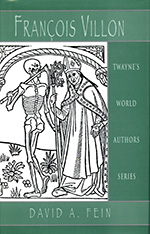
François Villon, one of the greatest lyric poets of the late Middle Ages, lived on the margins of French society and died in obscurity. The details of Villon’s life, including his disappearance after being exiled from Paris, are a puzzle that has occupied scholars throughout the twentieth century. His poems are rife with historical and personal references that were probably only meaningful to a select audience when they were written and are only explicable through supposition today. Fein suggests that a certain degree of uncertainty must be accepted by the student of Villon. In François Villon he directs his readers’ attention to the “discernible patterns of language and images, changing voices, familiar thematic strands” evident throughout the historical specifics. The range of subjects covered in this text reflects Fein’s balanced and comprehensive approach. Fein moves from a biographical sketch of Villon to an exposition of his poetry. He examines not only Villon’s masterpiece, “Testament,” but also his earlier long poem, the “Lais,” as well as five ballads. Fein explores biblical subtexts in Villon’s work, noting his emphasis on the Old Testament. He also studies Villon’s use of the literary and artistic motif of “la danse macabre.” He understands the importance of Paris in Villon’s work, so much that he composed this text with a map of fifteenth-century Paris at his side. Villon’s poetry centers on the Latin quarter, and his characters encompass all walks of Parisian life. Paris gives Villon’s work “its shape, its individuality, its vitality.”